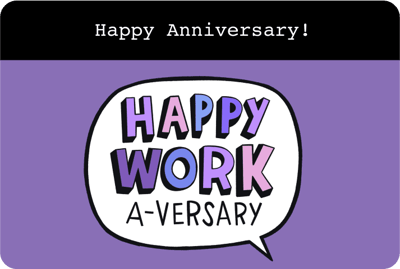Employee Milestones & Special Occasions
Empower your team to celebrate each other
From work anniversaries & birthdays to onboarding & farewell, Kudoboard gives your employees the perfect tool to easily celebrate employee special occasions




What employee milestones & moments do you want to celebrate?
Enhance the employee experience for birthdays, work anniversaries, and more.
How to celebrate employee milestones
Kudoboard’s online group cards allow you to gather employee appreciation from a group, delivered directly to the recipient virtually.
Create
Select an occasion
Pick an occasion for your group card. Style the board in minutes.
Invite
Invite people & groups
Watch the Kudoboard come to life as a group of people contribute to it.
Deliver
Deliver appreciation
Send the group card to the individual or team recipient. For added value, push a button to convert it to a slideshow, a book, attach gift cards or integrate to Slack, Teams, and your Intranet.
Delight
Boost morale, connection & happiness
It’s powerfully simple. Appreciated and connected people foster happy teams with thriving results.
Check out a few of our favorite employee milestone examples
Select a thumbnail below to see a Kudoboard employee recognition idea
Celebrate employee milestones and reap the benefits
Kudoboard gives your employees permission to show each other they care
Build camaraderie with your team—no matter where they are. Kudoboard’s online group cards allow everyone to celebrate together and builds employee engagement.
Unlimited space for creative, personalized posts is what sets Kudoboard apart. Add photos, GIFs, videos, links, and personal messages for your team. You can even add gifts cards and print the board as a book!



Major milestones matter
Recognizing major milestones makes a difference. Work anniversaries, hitting a goal or benchmark, and retirement should all be celebrated by the team!

Life events matter
From new baby celebrations to sympathy cards, Kudoboard helps you acknowledge the important moments in employee’s lives.

Create a culture of gratitude & employee appreciation
Your employees want to celebrate each other, and Kudoboard gives you the tools to make service awards easy for them.
Latest blog articles about milestones and moments
TAKE YOUR service awards & MOMENTS TO THE NEXT LEVEL
Get an Enterprise Plan

FAQs about celebrating employee milestones & moments
Employee milestones are significant events or achievements in an employee’s career within an organization. These milestones often represent key points in an employee’s journey, and they can be both personal and professional in nature. It is important to celebrate key milestones with service awards to improve employee engagement and morale. In summary, employee milestones are important for several reasons:
Employee Milestones Drive Career Advancement:
Milestones can signify an employee’s progress within the company, such as promotions, job title changes, or reaching a certain level of seniority.
Celebrating Employee Milestones drives Longevity:
Achieving certain milestones, like years of service, demonstrates an employee’s commitment and dedication to the organization.
Employee Milestones can Drive Development:
Milestones can represent the acquisition of new skills, certifications, or qualifications that enhance an employee’s capabilities and value to the company.
Employee Performance Recognition:
Some milestones may be linked to performance, such as achieving sales targets, meeting project deadlines, or receiving awards and recognitions. All great moments for employee recognition.
Employee milestones are notable achievements or events in an employee’s career. They can vary in type. Examples include:
- Years of Service Milestone: Recognizing employees for their tenure at the company, such as celebrating their 5th, 10th, or 20th work anniversary.
- Promotion Milestone: Acknowledging when employees are promoted to higher positions or assume greater responsibilities.
- Skill Development Milestone: Commemorating when employees acquire new skills, certifications, or qualifications relevant to their roles.
- Sales Achievement Milestone: Honoring employees who meet or exceed sales targets, quotas, or revenue goals.
- Project Success Milestone: Celebrating the completion of significant projects or the achievement of project-related milestones.
- Awards and Recognitions: Highlighting employees who receive awards or accolades for outstanding performance or contributions.
- Leadership Roles: Noting when employees are appointed to leadership positions, such as becoming a team leader or manager.
- Milestone Projects: Recognizing employees who lead or contribute significantly to key initiatives or initiatives that have a substantial impact on the organization.
- Customer Satisfaction: Applauding employees who consistently receive positive feedback or high ratings from customers or clients.
- Special Anniversaries: Marking other significant work-related anniversaries, such as joining the company, reaching a specific career milestone, or completing a significant number of projects.
These employee milestones are essential for fostering a positive company culture, increasing employee engagement, and showing employee appreciation for their dedication and contributions to the organization.
Yes, you should always celebrate employee achievements. Celebrating employee achievements is a valuable practice that can have a positive impact on your workplace.
Recognizing and celebrating employee achievements can boost morale and motivation. When employees feel that their efforts are acknowledged and appreciated, they are more likely to be engaged and satisfied with their work.
Celebrating achievements can inspire employees to strive for excellence and achieve even more. It sets a positive precedent for hard work and performance, which can lead to increased productivity.
Employees who feel valued and recognized for their accomplishments tend to have higher job satisfaction. This can contribute to higher employee retention rates, as satisfied employees are less likely to seek opportunities elsewhere.
Celebrating achievements can foster a sense of camaraderie and teamwork. It encourages team members to support and celebrate each other’s successes, which can strengthen team dynamics and employee appreciation levels.
A culture of employee recognition and celebration can lead to a more positive and inclusive workplace culture. It sends a message that the organization values and appreciates its employees.
A company that is known for celebrating employee achievements can be more attractive to potential hires. It demonstrates a commitment to recognizing and rewarding talent and contributions.
Recognizing achievements that align with the company’s goals and values reinforces the importance of those objectives and encourages employees to work toward them.
To effectively celebrate employee achievements, consider a range of recognition methods, such as a Kudoboard, verbal praise, certificates, awards, bonuses, or public recognition in team meetings or company-wide events. Tailor your approach to match the significance of the achievement and the preferences of the employee.
Recognizing and celebrating employee milestones is an important aspect of employee engagement and retention. Here is a strategy on how to recognize and celebrate employees.
Understand the Significance of Milestones:
- Before you can recognize and celebrate employee milestones, it’s important to understand what these milestones mean to the employee and the organization. Milestones can include work anniversaries, promotions, achievements, or personal events like birthdays.
Create a Recognition Program:
- Establish a formal employee recognition program within your organization. This program should outline the milestones to be celebrated and the ways in which recognition will be provided.
Personalize Your Recognition:
- Recognize employees in a way that is meaningful to them. Kudoboard allows you personalize recognition for employee milestones. Some employees may appreciate public recognition, while others may prefer a private acknowledgment. Some employees love gift cards.
- Consider the employee’s preferences and personality when planning the recognition.
Involve Peers and Team Recognition:
- Encourage coworkers and team members to join in celebrating milestones with an online group card. Their involvement can create a supportive and inclusive atmosphere.
Analyze and measure the impact of recognizing employees. To learn more about employee insights and analytics to measure recognition of employees, visit here.
Learn more about what is employee recognition here.
Yes, you should celebrate employee birthdays.
Celebrating employee birthdays is a simple yet impactful gesture that can foster a positive workplace culture and yield numerous benefits. Firstly, it humanizes the workplace. Recognizing an employee’s birthday acknowledges their individuality, reminding everyone that employees are more than just their job titles. It creates a sense of belonging and camaraderie within the team, enhancing team dynamics and collaboration. Moreover, celebrating birthdays demonstrates that the organization values its employees on a personal level, not just for their professional contributions.
Employee birthdays also serve as morale boosters. A birthday celebration can brighten an employee’s day and bring joy to the workplace. This uplifted mood can have a ripple effect, positively influencing the overall work atmosphere and productivity. Additionally, it contributes to employee retention. Recognizing birthdays shows that the organization cares about its employees’ well-being, which can lead to increased job satisfaction and a reduced likelihood of employees seeking opportunities elsewhere.
Furthermore, celebrating birthdays offers a break from the daily routine, injecting a bit of fun and relaxation into the workplace. It provides an opportunity for employees to socialize and bond, improving team cohesion. These moments of shared celebration can lead to stronger relationships and a more collaborative work environment.
Lastly, celebrating employee birthdays is a cost-effective way to promote a culture of employee appreciation and employee recognition. It sets a precedent for recognizing and appreciating individual achievements, which can extend to other aspects of an employee’s work. When employees feel valued and appreciated, they tend to be more engaged, motivated, and loyal to their organization, ultimately benefiting both the employees and the company as a whole. In conclusion, celebrating employee birthdays is a small but meaningful practice that can contribute to a positive workplace culture, boost morale, enhance team dynamics, improve retention, and promote overall employee well-being and satisfaction.
Yes, you should celebrate employee anniversaries.
Celebrating employee anniversary milestones is a crucial practice that holds significant benefits for both employees and organizations. Firstly, it recognizes and honors an employee’s dedication and commitment to the company. By acknowledging the years of service, the organization communicates its appreciation for the employee’s loyalty, hard work, and contributions, which can instill a sense of pride and fulfillment in the employee.
Moreover, celebrating these milestones plays a pivotal role in bolstering employee morale and job satisfaction. When employees see their years of service acknowledged and celebrated, it fosters a positive and supportive work environment. This recognition can lead to higher levels of motivation and engagement, as employees feel valued and appreciated for their ongoing contributions to the company’s success.
Employee anniversary celebrations also contribute to retention efforts. Recognizing and celebrating work anniversaries can create a strong sense of attachment and loyalty to the organization. Employees who feel appreciated and acknowledged for their years of service are less likely to seek opportunities elsewhere, resulting in reduced turnover and associated recruitment costs.








